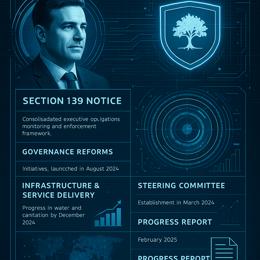Image created by AI
Auditor General's Report on South African Municipalities Backs AfriForum's Concerns
AfriForum's long-held cautions about the dire state of South African municipalities have found substantial backing in the recent report by the Auditor General (AG) for the 2022/23 financial year. Out of 257 municipalities across the nation, a scant 13%—just 34 municipalities—achieved clean audits, signaling a persisting governance crisis deeply affecting local administrations.
The AG's findings resonate with a sequence of cries made public by AfriForum over the years, pinpointing chronic mismanagement and deficient expertise as the core culprits for the municipal meltdown. With local governance in disarray, AfriForum is strongly advocating for municipalities to join forces with civil society organizations to tackle the crippling issues they face.
Despite the staggering figures presented by the AG, there are signs of positive change albeit minor, with 45 municipalities making incremental improvements. However, the situation has worsened in 36 municipalities compared to the 2020/21 audit results. It's distressing to note the specific mention of Ngwathe Local Municipality, which has faced a barrage of complaints from AfriForum, particularly about failing to provide essential resources like clean, running water.
Tackling the audit woes calls for more than just municipal introspection. AfriForum states that the crisis spills over into provincial and national echelons of government, implicating the Department of Cooperative Government and Traditional Affairs, and National and Provincial Treasurers in the fiasco.
Deidré Steffens, AfriForum's Local Government Affairs advisor, paints a stark image of towns without water, inaccessible roads, and crumbled infrastructure, with officials either apathetic or clueless in response to these crises. Steffens underscores the necessity for collaboration between municipalities and civic groups, highlighting AfriForum's readiness to assist in remedying the challenges highlighted by the AG.
Constitutionally, provincial intervention is feasible under section 139 to salvage failing municipalities, yet rare successes tilt the scale towards political manipulation rather than genuine recovery efforts. Given this backdrop, new initiatives by Velenkosini Hlabisa, Minister of Cooperative Government and Traditional Affairs, to remedy functional inadequacies within 21 days, is viewed with cautious optimism by AfriForum. Without concomitant action, these plans risk amounting to nothing.
Wrapping up, Steffens emphasizes the urgency with which Hlabisa, along with the Minister of Finance, Enoch Godongwana, must devise strategies to hold errant municipal officials accountable, propelling efforts to combat the municipal crisis comprised of mismanagement, misappropriation, and corruption.










